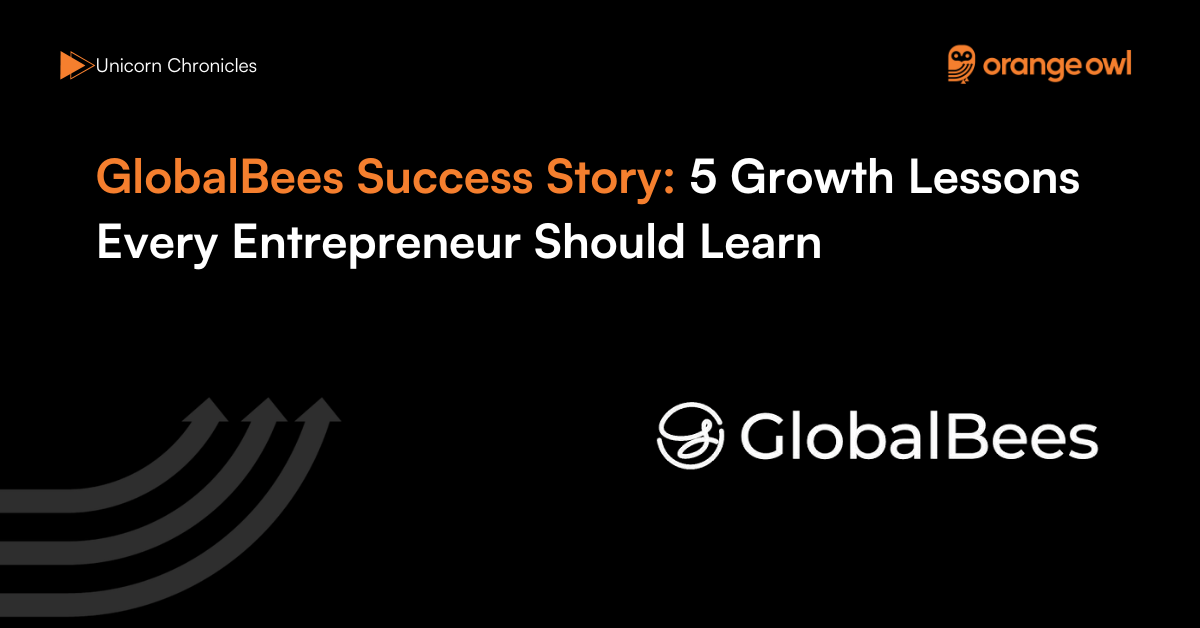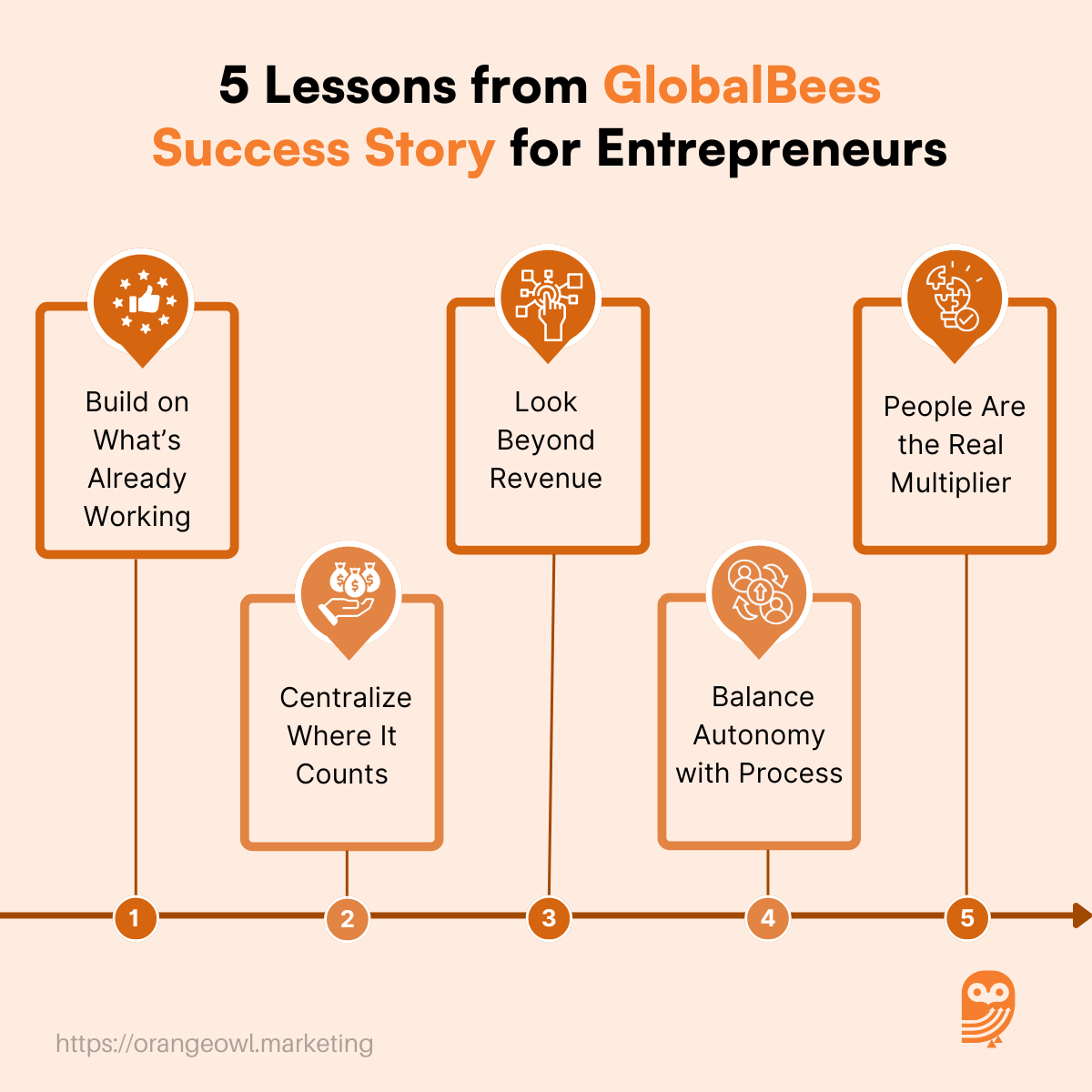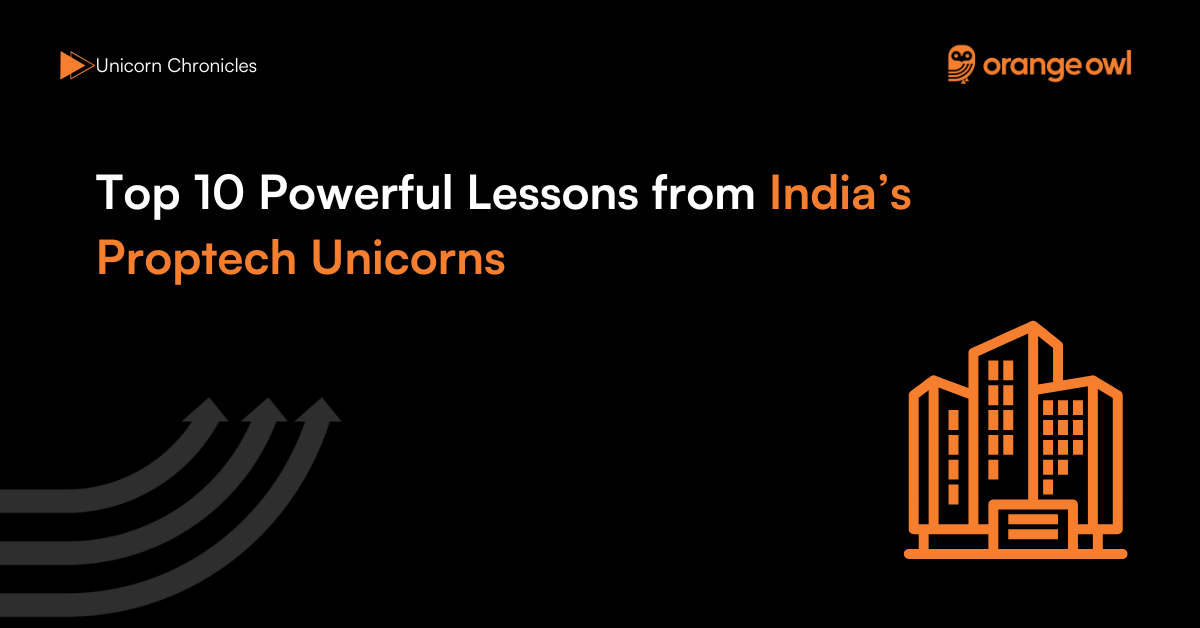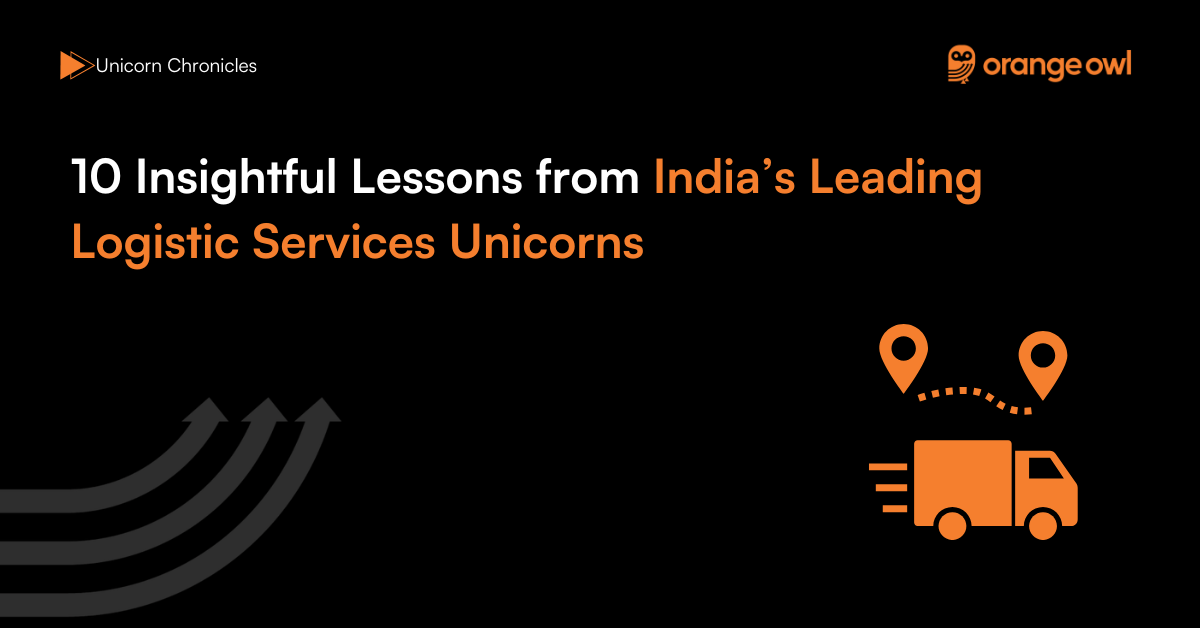GlobalBees Success Story: 5 Growth Lessons Every Entrepreneur Should Learn
Vivek Goel
June 10, 2025

Table of Contents
Introduction
GlobalBees isn’t your typical startup—it’s a modern-day brand factory, modelled after the successful roll-up/aggregator playbook. Since launching in 2021, it has acquired and scaled over 25 digital-first D2C brands across categories like beauty, wellness, homecare, and nutrition.
Within a short span, GlobalBees has emerged as one of India’s largest e‑commerce roll-up companies, combining operational excellence, deep capital resources, and a technology-first mindset to revolutionize consumer brand building.
Backed by heavyweights like FirstCry, SoftBank, Lightspeed, PremjiInvest, Chiratae, and ChrysCapital, the company raised a record $150 million Series A (with $75 M equity and $75 M debt) in July 2021. A few months later, it raised $110 million Series B led by PremjiInvest, propelling it to unicorn valuation ($1.1 billion) .
By centralizing critical functions—marketing, supply chain, analytics, talent management—GlobalBees gives each of its portfolio brands access to scale advantages typically out of reach for standalone D2C startups. This approach allows them to rapidly amplify promising brands, turning them into national household names. Their vision, as summed up by co‑founder Nitin Agarwal, reflects this ambition:
“We don’t just invest in brands—we amplify them. Our mission is to turn promising D2C businesses into household names.” — Nitin Agarwal, CEO & Co‑founder, GlobalBees
While specific dollar figures and acquisition metrics are evolving, GlobalBees’ rapid brand roll-up and fast scaling underlines the strength of their model—helping brands grow faster and stronger through centralized support and cross-category insights.
Origin Story
GlobalBees was founded in 2021 by Nitin Agarwal, a former President and Group CFO at Edelweiss Financial Services, with deep experience in mergers, acquisitions, and scaling businesses. The venture was incubated with strong backing from FirstCry, led by Supam Maheshwari, which provided both strategic capital and retail ecosystem insights.
The inception of GlobalBees came at a crucial time. India was witnessing a boom in D2C (Direct-to-Consumer) brands—young companies gaining traction through platforms like Amazon, Flipkart, Nykaa, and Myntra. These brands often built niche customer love but struggled to cross the chasm from small-scale operations to national-level growth. Most lacked deep digital marketing prowess, structured supply chain capabilities, or the capital to fuel aggressive expansion.
That’s when Nitin and his team saw an opportunity. Inspired by the success of Thrasio in the U.S., GlobalBees set out to adapt the brand roll-up model for the Indian ecosystem—but with a sharper focus on technology enablement, brand empathy, and long-term category leadership.
“India has thousands of brands that are loved by consumers but haven’t yet unlocked scale. That’s the whitespace we’re building in.”
— Nitin Agarwal
GlobalBees wasn’t just about acquisition—it was about transformation. The mission was to identify digital-first brands with high consumer love, then turbocharge their journey using shared infrastructure in performance marketing, logistics, working capital, cross-platform presence, and real-time analytics.
Business Landscape and Early Challenges
The Indian D2C market is massive and growing rapidly—estimated to reach $100 billion by 2025, up from $44.6 billion in 2021 [source]. Every year, 2,000–3,000 new digital brands launch, but few survive the scale-up phase due to fragmented logistics, rising CAC (customer acquisition cost), and lack of access to growth capital.
GlobalBees entered this complex, high-potential ecosystem with a focused model—but it came with its own challenges:
- Sourcing the Right Brands: Not every D2C brand is a good fit for acquisition. GlobalBees had to design stringent filters—only acquiring those with strong repeat metrics, scalable gross margins, and the potential to become category leaders in their niche. This meant evaluating thousands of brands but closing only on a handful.
- Integration Hurdles: Post-acquisition, merging supply chains, accounting systems, marketing playbooks, and inventory management wasn’t straightforward. GlobalBees had to create an “Operating System for Brands” that could plug-and-play with minimal friction while delivering consistent outcomes.
- Brand Identity vs. Centralization: Each brand came with its unique tone, customer base, and positioning. Over-standardizing would strip away brand personality. The GlobalBees team focused on building modular growth engines—standardized in process but flexible in brand expression.
- Market Skepticism: The Thrasio-style roll-up model was still nascent in India. Many investors questioned whether Indian brands could scale post-acquisition. Similarly, founders were reluctant to hand over their businesses unless GlobalBees demonstrated value beyond just capital.
“This business is as much about empathy as it is about execution. You’re inheriting a founder’s baby—you need to grow it, not smother it.” — Nitin Agarwal
Despite these challenges, GlobalBees’ disciplined approach and human-first execution made it one of the fastest companies in India to reach unicorn status, proving that scaling loveable D2C brands is both an art and a science.
Growth Strategies
GlobalBees’ rapid rise wasn’t just about buying brands—it was about scaling them systematically. The company adopted a highly disciplined acquisition strategy, targeting digital-first brands with annual revenues in the ₹10–50 crore range, strong customer loyalty, and the potential to dominate niche categories.
These weren’t vanity acquisitions; they were data-backed bets on scalable fundamentals. Once onboarded, each brand was empowered through GlobalBees’ full-stack enablement model—a centralized growth engine that combined performance marketing, supply chain optimization, cross-platform distribution, and strategic pricing expertise.
With a team seasoned in marketplace mastery, especially on Amazon, Flipkart, and Nykaa, GlobalBees often helped brands achieve double or even triple-digit growth within 12 months. The company also took a diversified approach by acquiring brands across segments like beauty, wellness, homecare, nutrition, and personal care, thereby reducing dependency on any single vertical and unlocking operational synergies.
Backed by over $150 million in funding from marquee investors like SoftBank, FirstCry, and Lightspeed, GlobalBees also built a top-tier leadership team with talent from Unilever, Amazon, Flipkart, and other category leaders. This infusion of capital and expertise ensured each acquired brand received dedicated attention—a “startup within a startup” structure that fueled accelerated, sustainable growth.
“Every brand we bring in gets a dedicated team—almost like a startup within our startup. That’s how we ensure focus and speed.” — Nitin Agarwal
Marketing Strategies
While GlobalBees is often viewed as a backend operational powerhouse, its true differentiator lies in how it amplifies brand visibility and consumer resonance. Upon acquisition, many brands undergo a strategic revamp and repositioning, with new packaging, improved storytelling, and sharper visual identities designed to appeal to broader, evolving demographics.
The company also invests heavily in platform-specific optimization—tweaking product titles, images, descriptions, SEO keywords, and customer review strategies tailored to each marketplace’s algorithm. This granular approach enables brands to stand out on crowded platforms like Amazon and Nykaa.
Moreover, GlobalBees deploys data-led campaigns, drawing performance insights from across its portfolio to design high-ROI strategies, from influencer collaborations to paid digital ads. Importantly, the company doesn’t force-fit one-size-fits-all tactics—instead, it lets the data dictate the growth path, whether it’s influencer marketing, content-led SEO, or social commerce.
The result? Brands that consumers may not realize are part of GlobalBees, but ones they trust for product quality, delivery reliability, and consistent voice.
“We don’t force synergy—we let data decide. Some brands do well with influencers, others with SEO. It’s about finding the right growth recipe.” — Nitin Agarwal
5 Growth Lessons Every Entrepreneur Should Learn from GlobalBees
1. Build on What’s Already Working
GlobalBees didn’t try to reinvent the wheel—it simply made it spin faster. The team recognized the accelerating wave of digital-first, consumer-centric D2C brands flourishing on marketplaces like Amazon, Flipkart, and Nykaa. Instead of launching their own brands from scratch, they identified ones already resonating with consumers and injected them with the operational strength, marketing intelligence, and capital required to scale.
This approach proves that entrepreneurship doesn’t always mean building something new—it can also mean spotting what’s already working and making it work 10x better. Many of GlobalBees’ brands were already profitable and growing—but lacked the muscle to become household names. That’s the whitespace GlobalBees filled.
2. Centralize Where It Counts
Rather than letting each brand struggle individually with backend challenges, GlobalBees created a centralized operational backbone—streamlining functions like supply chain management, logistics, finance, HR, legal compliance, and performance marketing.
This freed up brand teams to focus entirely on customer experience, innovation, and storytelling. Entrepreneurs can take a cue here: centralizing repetitive, non-core operations can free up time and mental energy for creative growth.
GlobalBees turned what was once a solo hustle for each founder into a shared infrastructure advantage—unlocking efficiency and speed at scale.

3. Look Beyond Revenue
In a world obsessed with topline metrics, GlobalBees looked deeper. Their acquisition strategy didn’t revolve around just how much a brand was earning, but how sustainably it was growing. They evaluated customer retention, Net Promoter Score (NPS), margin health, product reviews, and brand love before investing.
This long-term mindset reminds entrepreneurs that vanity metrics may attract attention, but real growth comes from customer obsession and operational discipline.
“It’s not about how many people buy once—it’s about how many come back. That’s how you know a brand has real staying power.” — Nitin Agarwal
4. Balance Autonomy with Process
One of GlobalBees’ most important balancing acts was allowing acquired brands to retain their individual ethos and identity, while still benefiting from shared systems and strategies. Each brand had different audiences, tones, and goals—so instead of enforcing a one-size-fits-all template, GlobalBees offered customized support.
Entrepreneurs can learn from this flexibility: scaling doesn’t mean sacrificing identity—it means supporting it with stronger scaffolding. Brands like The Better Home, Prolixr, or Absorbia still feel unique—because they’re not smothered by central processes, but strengthened by them.
5. People Are the Real Multiplier
At the heart of GlobalBees’ success is its high-performance culture. The company hired top-tier talent from FMCG, tech, and startup ecosystems—experts in everything from category management to digital growth.
More importantly, it fostered a culture of ownership, meritocracy, and urgency. Every brand had a dedicated team driving it forward. For entrepreneurs, this reinforces a timeless truth: even the best business models fail without the right people to execute them.
“Behind every scaled brand is a team that moves like a founder. That’s the only way to build at startup speed with enterprise-level impact.” — Nitin Agarwal
Conclusion: Key Takeaways from GlobalBees’ Journey
The GlobalBees success story isn’t just about rolling up D2C brands—it’s about scaling Indian entrepreneurship with systemized empathy. In just a few years, the company has created a modern brand factory, acquiring over 25+ high-potential brands and enabling them to thrive through shared infrastructure, deep expertise, and performance-led execution.
This model proves that brand-building doesn’t need to be a solo journey. With the right combination of capital, talent, data, and distribution, entrepreneurs can transform already-loved products into national champions.
As GlobalBees looks ahead, the vision is even more ambitious—100+ brands, each solving a real household need across India’s vast and diverse consumer landscape.
“In the next 5–10 years, we’ll have 100+ brands, each solving a real problem for Indian households. That’s the dream.” — Nitin Agarwal
For today’s founders, the GlobalBees success story is a powerful reminder: you don’t need to launch more brands to win—you need to grow the right ones, the right way. It’s not about reinventing the D2C wheel. It’s about connecting the spokes—with systems, empathy, and execution excellence.


